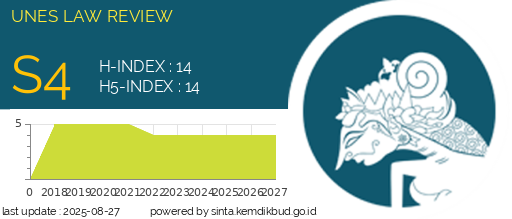Analisis Tindak Pidana Pencemaran Nama Baik Oleh Aktivis Lingkungan Hidup Terhadap Tambak Udang Ilegal di Taman Nasional Karimunjawa (Study Kasus Daniel Frits Tangkilisan)
DOI:
https://doi.org/10.31933/unesrev.v6i4.2111Keywords:
Activists, Environment, ITEAbstract
This research aims to analyze criminal acts of defamation by environmental activists against illegal shrimp ponds in Karimunjawa National Park. The research approach uses a statutory approach, namely using the laws of the Unitary State of the Republic of Indonesia, the Criminal Code. Criminal Procedure Code, Law Number 1 of 2024 concerning Information and Electronic Transactions and Article 66 of Law Number 32 of 2009 concerning Environmental Protection and Management (UUPPLH). Type of research, in this research the author uses qualitative data. The results of this research are that a speech can be said to be hate speech if there is a malicious intention from the perpetrator of the speech to encourage hostility, invite discrimination, and calls for violence (incitement to violence), against certain groups of the population based on ethnicity, religion, race and between groups and Daniel Frits' upload is far from all of that. Efforts that an activist can take if he is criminally sued is by filing an appeal against the judge's verdict, in this case Daniel, who has been sentenced by the judge, files an appeal with the help of his attorney, because Daniel's attorney assesses Daniel as an environmental fighter in Karimunjawa who has experienced the impact. due to illegal shrimp farming, and is supported by Articles 65 and 66 of Law Number 32 of 2009 concerning Environmental Protection and Management. Legal Protection of Environmental Activists in a Criminal Perspective, From a criminal law perspective environmental activists are supported by Article 66 of Law Number 32 of 2009 concerning Environmental Protection and Management (UUPPLH) which states that everyone who fights for the right to a good and healthy environment cannot be prosecuted criminally or sued civilly, it has multiple interpretations and is not implemented
Downloads
References
Hernanda, D. A., & Rusdiana, E. (2021). Problematika Hukum Pejuang Lingkungan Hidup dalam Pasal 66 Undang-Undang Nomor 32 Tahun 2009 tentang Perlindungan dan Pengelolaan Lingkungan Hidup. Novum: Jurnal Hukum.
Idham, R. (2021). Penegakan Hukum terhadap Tindak Pidana Penghinaan atau Pencemaran Nama Baik Melalui Media Sosial. Petitum.
Saleh, I. N. S., & Gadsia Spaltani, B. (2022). Reformulasi Perlindungan Hukum Bagi Pejuang Hak Atas Lingkungan Hidup Yang Baik Dan Sehat. Jatiswara. https://doi.org/10.29303/jtsw.v37i2.402
Zulfan, AKA, L., & Dewi Maya Sari. (2021). EFEKTIVITAS PENERAPAN UNDANG-UNDANG ITE TERHADAP PELAKU PENYEBARAN HOAKS COVID-19 DI MEDIA SOSIAL. Jurnal Transformasi Administrasi. https://doi.org/10.56196/jta.v10i02.164
Downloads
Published
How to Cite
Issue
Section
License
Hak cipta :
Penulis yang mempublikasikan manuskripnya di jurnal ini menyetujui ketentuan berikut:
- Hak cipta pada setiap artikel adalah milik penulis.
- Penulis mengakui bahwa UNES Law Review berhak menjadi yang pertama menerbitkan dengan lisensi Creative Commons Attribution 4.0 International (Attribution 4.0 International CC BY 4.0) .
- Penulis dapat mengirimkan artikel secara terpisah, mengatur distribusi non-eksklusif manuskrip yang telah diterbitkan dalam jurnal ini ke versi lain (misalnya, dikirim ke repositori institusi penulis, publikasi ke dalam buku, dll.), dengan mengakui bahwa manuskrip telah diterbitkan pertama kali di Jurnal UNES Law Review.



















